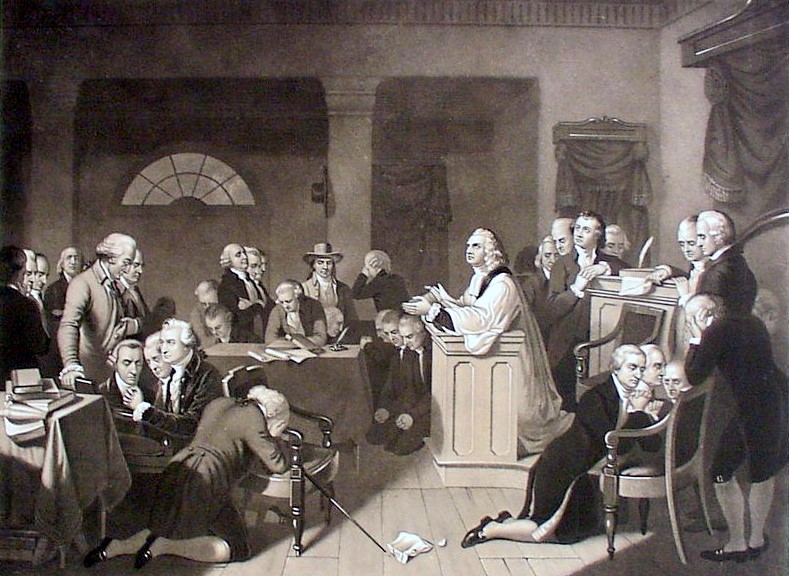 WASHINGTON — On the same day that it declined an appeal of a Fourth Circuit ruling against a county board of commissioners’ Christian prayers, the U.S. Supreme Court also decided not to hear an attempted appeal of a Sixth Circuit ruling upholding the Christian prayers of another county board of commissioners. The decision not to accept either case—for or against Christian prayers at county commissioner meetings—leaves the federal appeals circuit split on the matter, and leaves some governing bodies free to continue their practice and others forbidden from doing so.
WASHINGTON — On the same day that it declined an appeal of a Fourth Circuit ruling against a county board of commissioners’ Christian prayers, the U.S. Supreme Court also decided not to hear an attempted appeal of a Sixth Circuit ruling upholding the Christian prayers of another county board of commissioners. The decision not to accept either case—for or against Christian prayers at county commissioner meetings—leaves the federal appeals circuit split on the matter, and leaves some governing bodies free to continue their practice and others forbidden from doing so.
“Our country has a long history of legislator-led prayer, just as the Sixth Circuit determined in our favor,” First Liberty Institute President Kelly Shackelford, who represented the Jackson County Board of Commissioners, said in a statement. “Thankfully our clients in Jackson County, Michigan will be able to continue their tradition. We hope the Supreme Court will one day extend that protection across the country.”
As previously reported, the Jackson County Board of Commissioners had been sued in 2013 by local pagan and animist Peter Bormuth, who asserted that the commissioners’ “prayers are unwelcome and severely offensive to [him] as a believer in the pagan religion, which was destroyed by followers of Jesus Christ.”
On a rotational basis, the nine elected commissioners would deliver an invocation at the start of each public meeting, and were permitted to present a prayer no matter what their religion. However, as all the commissioners identify as Christian, the prayers are always presented in the name of Jesus.
“Lord, we ask that you would be with us while we conduct the business of Jackson County. Lord, help us to make good decisions that will be best for generations to come,” read one of the example prayers cited by the court.
However, Bormuth said that the prayers made him feel like he was attending a church service and that he was being “forced to worship Jesus Christ,” even though he declined to stand and did not participate. He also objected that Christians “have an exclusive lock on this franchise” because Jackson County is “70 percent Christian.”
Bormuth filed a legal challenge in an effort to stop the prayers, asserting that they violate the Establishment Clause of the First Amendment to the U.S. Constitution. “Congress shall make no law respecting an establishment of religion,” the cited clause reads.
He also contended that the request for those in attendance to rise and bow their heads is coercive.
In 2015, U.S. District Court Judge Marianne Battani ruled against Bormuth, although seemingly reluctantly.
“[T]he court finds that Jackson’s legislative prayer practice does not violate the Establishment Clause. Although the court believes the better practice would be to exclude legislative prayer from governmental proceedings altogether, it is constrained to follow the Supreme Court precedents set forth in Marsh and Greece by upholding the practice presently at issue,” she wrote.
“[T]he Supreme Court has already determined that legislative prayer delivered exclusively according to one religious tradition, even over many years, does not violate the Constitution,” Battani noted.
Bormuth appealed to the Sixth Circuit Court of Appeals, which overturned Battani’s ruling 2-1 in concluding that because the prayers have only been Christian, they are an unconstitutional government endorsement of religion.
“[The commission] is preventing participation by religious minorities and endorsing a specific religion,” the majority ruled in February 2017. “The prayer practice is well outside the tradition of historically tolerated prayer, and it coerces Jackson County residents to support and participate in the exercise of religion.”
However, the ruling was appealed to the full 15-member Sixth Circuit, which overturned the panel’s decision last September.
“At bottom, Bormuth has shown he was offended by the Christian nature of the board’s prayers. But ‘[o]ffense … does not equate to coercion,’” the majority wrote. “Jackson County therefore did not ‘engage in impermissible coercion merely by exposing [Bormuth] to prayer [he] would rather not hear and in which [he] need not participate.’”
“The prayers ‘vary in their degree of religiosity’ and often ‘invoke the name of Jesus, the Heavenly Father, or the Holy Spirit,’ but Town of Greece makes clear the Founders embraced these universal and sectarian references as ‘particular means to universal ends,’” the court said.
Bormuth appealed to the U.S. Supreme Court, which declined to hear the case on Thursday. However, the majority also decided not to review a ruling against the predominantly Christian prayers of the Rowan, North Carolina County Board of Commissioners.
In his dissent surrounding the court’s decision to decline the Rowan County case, Justice Clarence Thomas noted that the matter now leaves the nation divided on the legality of the issue. He felt that the high court should have accepted the case and resolved the matter for the country.
“The Sixth Circuit … upheld a municipal prayer policy virtually identical to Rowan County’s. … Thus, the Sixth and Fourth Circuits are now split on the legality of legislator-led prayer. State and local lawmakers can lead prayers in Tennessee, Kentucky, Ohio, and Michigan, but not in South Carolina, North Carolina, Virginia, Maryland, or West Virginia. This court should have stepped in to resolve this conflict,” he opined, being joined in his dissent by Justice Neil Gorsuch.
Read his comments in full here.
Become a Christian News Network Supporter...


